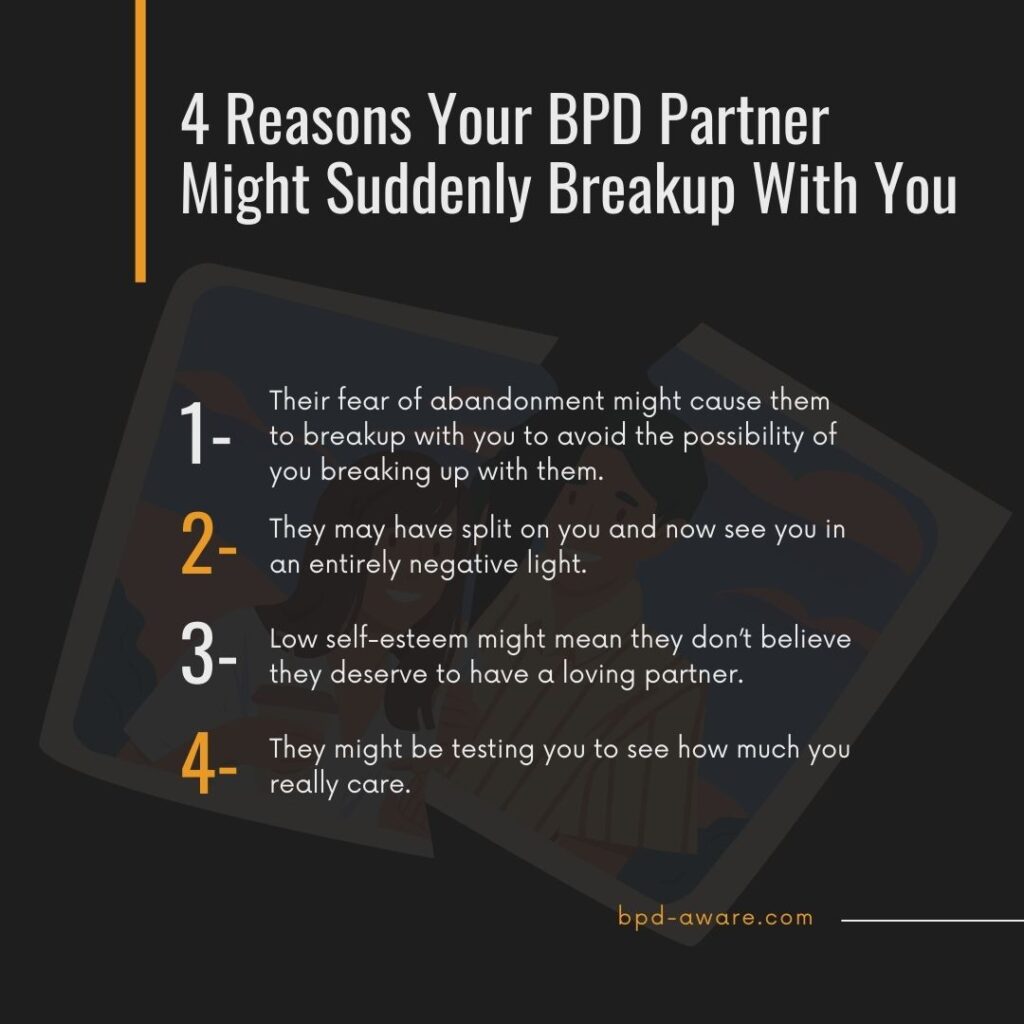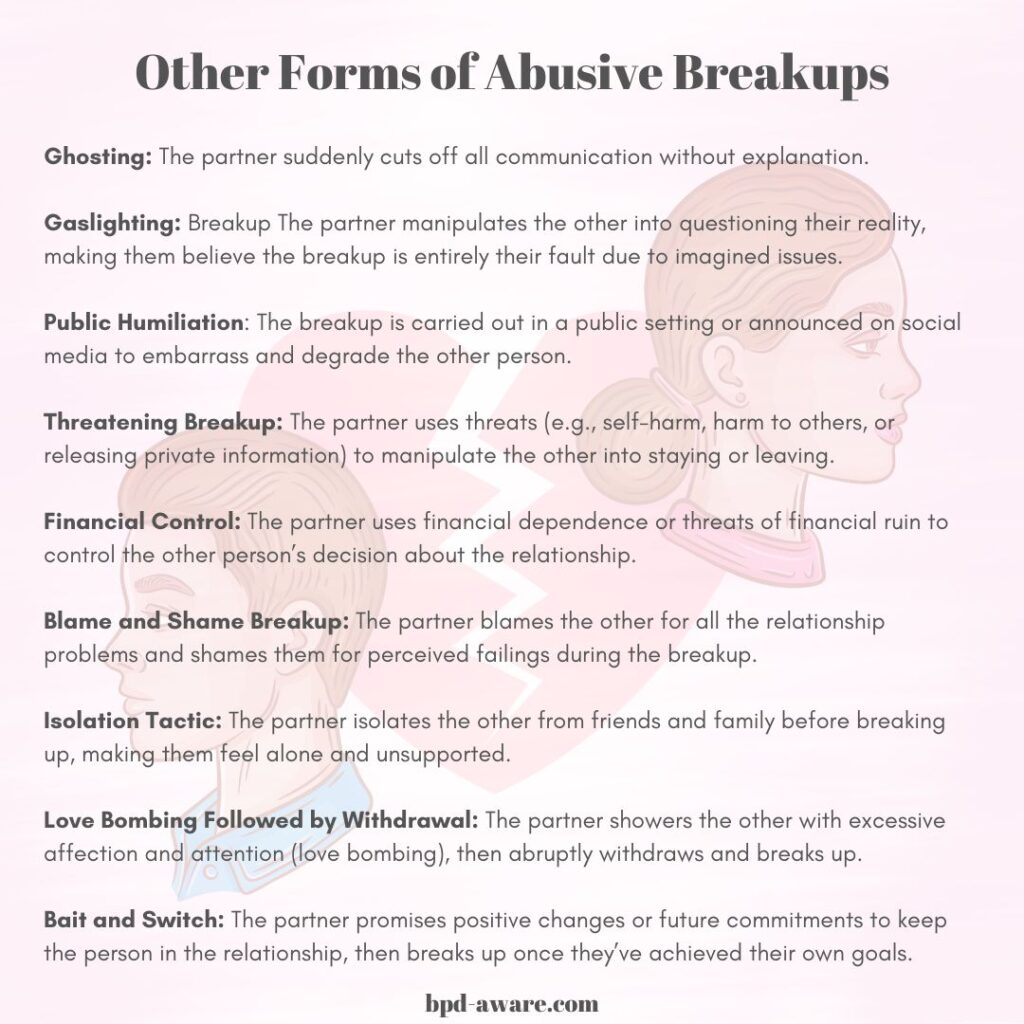Borderline Personality Disorder (BPD) is a complex mental condition that affects millions of people around the world. Its symptoms include emotional instability, fear of abandonment, and difficulty maintaining healthy relationships, among others. It’s these three symptoms that we will be mainly focusing on in this article though as we cover the topic of BPD and the sudden breakup.
A sudden breakup is when one partner ends a relationship without any indication that the relationship was in trouble. It can feel like they’ve been ambushed. While it typically refers to romantic relationships, it can also refer to friendships and familial relationships.
The person on the receiving end of a sudden breakup is typically caught by surprise by the abruptness of the breakup, which can heighten the emotions of an already emotional situation. The person delivering the breakup will often refuse to give reasons for the breakup and will present the break as being definitive, with no room for discussion.
Despite the breakup being presented as definitive, people with BPD will often regret their decision and later attempt to reconcile.
The sudden breakup can certainly be seen as a form of abusive behavior. So why would some people with BPD, who’ve often been the victims of abuse themselves, perform such an act?
Why People With BPD Might Suddenly Breakup
Before we begin looking at the reasons why someone with BPD might perform a sudden breakup with their partner, it’s important to note that this isn’t something that everyone with BPD does. It may be a more common breakup method among people with BPD, but it’s also certainly not restricted to only those with Borderline Personality Disorder.
Several BPD symptoms go some way to explaining with someone with BPD might suddenly end a relationship without warning.
The emotional instability experienced by individuals with BPD can lead to a lot of impulsive, unpredictable behavior. When you combine this with the borderline tendency to split on others, this is a recipe for unstable relationships. While the neurotypical partner might not sense anything wrong in the relationship, the mind of the borderline partner can paint quite a different picture. A perceived sleight or criticism that would be brushed off by most can become a point of fixation for the partner with BPD. It gnaws at them until they make a mountain out of a molehill, decide that the relationship is doomed, and decide to break things off.
But that’s not the only possible reason behind someone with BPD suddenly breaking up with their partner. Most people with BPD suffer from a fear of abandonment. This fear can manifest itself in several ways but one of those ways is in abruptly ending relationships to avoid that perceived sense of rejection or abandonment. “If I leave them first, they can’t reject me!” A relationship might be going incredibly well, almost too well, making the BPD partner want to “jump ship” in case they get seriously hurt by the other partner leaving them.
Another potential reason, again linked to the fear of abandonment, is breaking up to see how their partner reacts. The individual with BPD may want to see how their partner reacts to the prospect of a breakup and see how much it hurts them. If they react calmly, the person with BPD may see this as their partner having never really cared about the relationship. If their partner seems seriously upset, this may be an indicator to the borderline partner that the relationship was legitimate. Of course, testing a partner is never a healthy thing to do and is abusive behavior.
So the sudden breakup could be for any of the reasons above, a combination of the reasons, or even something more unique to the individual. What it all boils down to though is self-protection. The person with Borderline Personality Disorder wants to protect themselves from emotional pain. However, this is maladaptive and unhealthy behavior that ultimately causes more pain than being true and honest.

The Impact on Partners
Now that we’ve discussed why someone with BPD might end a relationship without warning, it’s only fair to look at it from the perspective of the other partner.
Breakups always hurt, no matter the situation. However, the sudden and unexpected nature of a sudden breakup can cause a great deal of confusion and emotional turmoil to the person on the receiving end. The partner will likely experience grief, insecurity, and even resentment over the breakup. This can lead to trust issues in future relationships.
The immense negativity caused by such a breakup can cause mental health problems such as depression, anxiety, and even personality disorders. An unexpected breakup is, after all, a form of trauma and it’s trauma that often leads to personality disorders. The twisted irony of an ambush breakup performed by someone with BPD is that it can cause many of the traits associated with BPD itself. It’s a classic example of hurt people hurt people and the perpetual nature of abuse.
How Best To React To A Sudden Breakup
It’s perfectly normal to feel upset and even angry when you’ve been the victim of a sudden breakup but it’s best to avoid reacting in an overly emotional manner if you can help it. As we mentioned earlier, the BPD partner may be looking for a highly emotional response but that doesn’t mean you should give them what they want. When you give abusive behavior the response it wants, you reward and embolden that sort of behavior in the future.
Instead, try to take the high road and focus on yourself after the breakup. Practice self-care and lean on your friends and family for support while you get over the end of the relationship and decide how you want your life to move forward.
There’s a good chance that your partner may try and reconcile with you in the future. The black-and-white thinking of BPD can swing both ways and the “terrible relationship” they were stuck in one day may swing around to being the “best relationship they ever had” the next. You need to decide if this is something you can deal with as it could happen again in the future. Deciding that the relationship is truly over, no matter what, is a perfectly valid decision.
If the relationship does reconcile, you may want to set some boundaries related to the future of your relationship. This can include things such as what’s acceptable behavior within the relationship, as well as what’s acceptable behavior should the relationship break again. For example, you may want to make it clear that neither of you will see other people for at least a month after any kind of breakup between you both. That can spare a lot of jealousy and hurt feelings, especially if you get back together again.
Another important boundary that you need to set is that your partner must seek treatment for their condition if they’re not already. Without treatment, the cycle of sudden breakups and other maladaptive behavior is likely to continue.

Final Thoughts
A sudden breakup can be extremely hurtful to the person on the receiving end. At its worst, it can be considered abusive behavior. While this abusive behavior may come from a place of self-protection, that only explains the behavior, it doesn’t excuse it.
There’s a strong possibility that the BPD partner may ultimately regret their decision and attempt to reconnect with you. It’s up to you whether or not any reconciliation goes ahead. If you believe your partner is truly sorry and they’re making efforts to better themselves, then you may wish to give the relationship another chance. If you don’t believe your partner is making efforts to recover from BPD, then it’s likely in your best interest to end the relationship there to save yourself any further pain.
Breakups are challenging, especially when they come from out of the blue. In the following months, you need to focus on yourself and allow yourself to grieve the end of the relationship. Be willing to ask for support from friends and family to help you through those difficult times. You may even wish to consider therapy.
With proper self-care, you can emerge from a sudden breakup stronger than you were before but it will take time and work.
Sources, Resources, and Further Reading
- “What Happened When I Stopped Walking on Eggshells in My Relationship”: https://www.additudemag.com/bdp-splitting-borderline-personality-disorder-adhd/
- Recovering from a Breakup with Borderline Personality Disorder: https://thirahealth.com/2023/01/30/recovering-from-a-breakup-with-borderline-personality-disorder/
- How to Get Over an Unexpected Breakup and Move On: https://www.vice.com/en/article/how-to-get-over-unexpected-breakup/
















